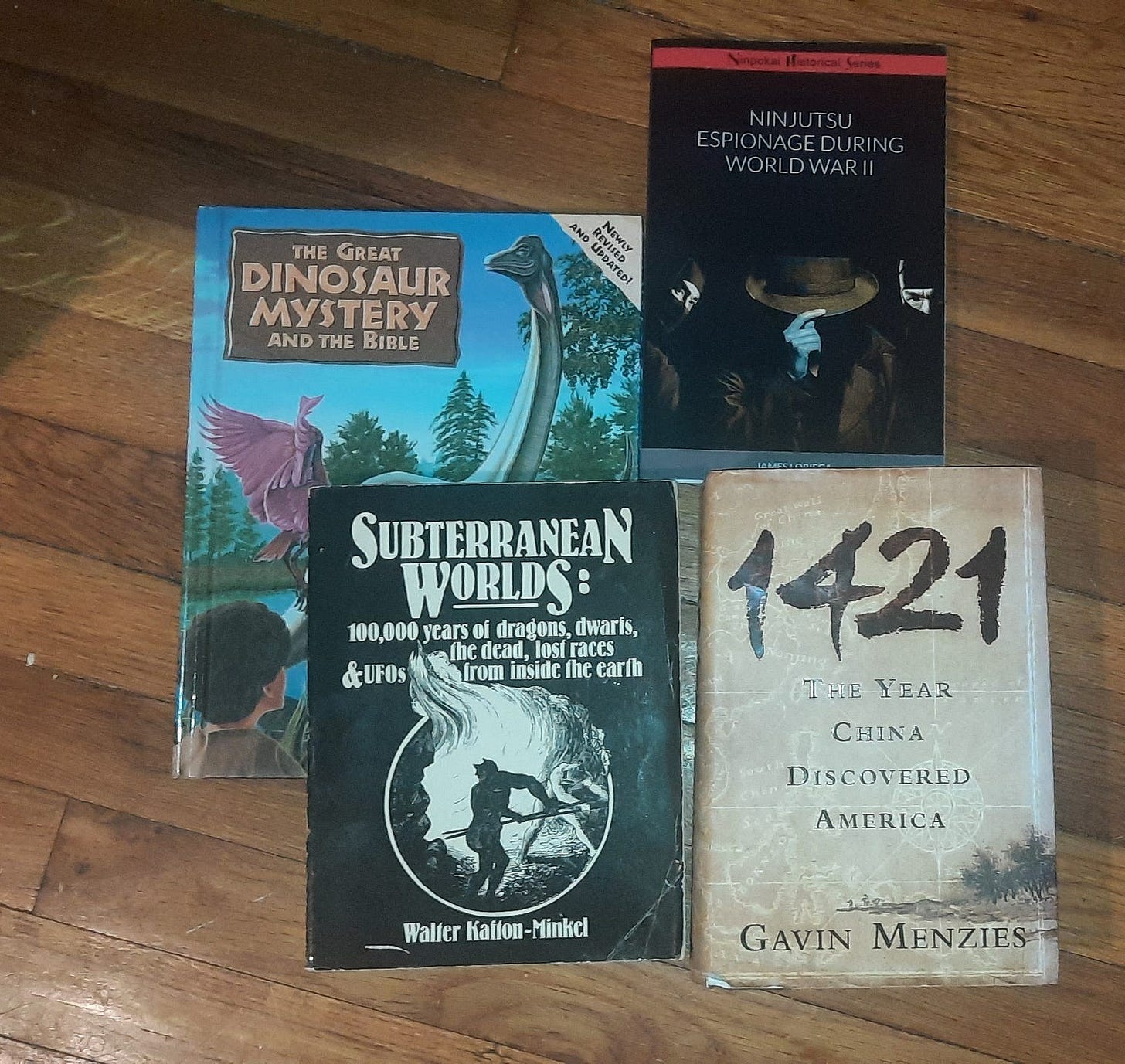Historical Debate and the Limits of Useful Political Discussion; Reality Checking your Friends and Neighbors' Online Political Fantasies Before It's Too Late.
When do you cut these discussions short?
Greetings! Thanks for coming back for your weekly Asian Studies fix!
Not too long ago, I stumbled across some of my old grad school email addresses and added a few names of people who I thought might appreciate this publication and perhaps even spread the word. ( And let me say, I am genuinely glad to see a couple of you are still alive. You probablyS know who you are. ) Sunday evening at 5:00pm (Eastern Standard Time), I send an essay on a subject related to Chinese, Asian, or Asian-American history. Recently, on Thursdays I have begun sending a shorter piece relating to the same subjects but sharing some video or other media that I found mostly on the internet.
So far, things are free (although it would be nice if people were to purchase a paid subscription), but some day that will change. If you were added recently, don’t worry, when that happens you will receive a free comp subscription for a while.
While this was originally intended as a no politics, “no Trump talk” zone, for obvious reasons, I have begun adding some thoughts on current events, but I do try to limit it. This week, though I have decided to discuss the relationship between discussing history, discussing recent and current events and their political implications, and when to avoid or simply cut discussions short or not even have such discussions at all.
Next Sunday I continue the topic of discussing history or current events with people with radically different beliefs while adding a lot about dinosaurs on Noah’s Ark, too. (Well, some people honestly believe this is history, and there are lessons to be learned from discussing how to interact with them should we meet them. Seriously.) The week after that I expect to return to the recent series on how superhuman martial arts stunts are performed, and, after that I hope to return to Chinese in the Old American West and the California Gold Rush, another long-covered subject. I recently got a few weeks ahead with writing my pieces and hope people see positive change here.
Thanks again for stopping by. — Peter Huston






Chinese cigarette advertisement posters from 1930s, pre-Communist Republic of China era China. My graduate adviser from when I studied Chinese history, Sherman Cochran, had a large collection of these, most better looking than the ones I found while writing this.
Historical Debate and the Limits of Useful Political Discussion; Reality Checking your Friends and Neighbors' Online Political Fantasies Before It's Too Late.
When I was in graduate school, I was blessed to have an academic adviser named Sherman Cochran. Dr Cochran was a historian specializing in Chinese Business history of the Republican Era, meaning 1911-1949. He knew a great deal about the era and had done the hard work of mastering the Chinese language to be able to read hand-written Chinese correspondence and records from the period -no mean feat. He was a serious scholar with high standards of excellence and also a friendly and approachable man. I feel very lucky to have had him as my academic advisor.
Healthy Historical Debate
Dr Cochran taught a graduate level seminar called “Problems in Modern Chinese History” where each week students were given a statement or assertion about a topic or event in Chinese history and then about eight assigned heavy duty readings on the topic. An example would be an academic paper or chapter from an academic book. We would then be required to debate or discuss the statement now that we had done the readings.
The statements we discussed were usually ideas that most of us had believed before the class but soon learned were much more complicated. As we were discussing Chinese history, many of the topics were obscure to most Americans, but a few examples were “the opium war was largely a culture clash,” “the Manchus conquered China in the 17th Century but became assimilated by the Chinese and lost their culture by the early 20th Century,” and “during World War Two, the Communist forces fought the Japanese invaders much harder than the Nationalist forces.” All were discussed and debated, with valid sources for statements at hand and easily cited, and we all learned a lot and I thought it was a lot of fun too. (Okay, I have a strange sense of fun. What do I do for fun? Study Chinese history and ride around on ambulances. Probably a big hint as to why I do not have a girlfriend at the moment.)
A small selection of books from my collection that will never, ever be debated in a graduate school seminar like “Problems in Chinese History.” Actually “Subterranean Worlds” is a very well done, well researched book on the history of a strange idea, but the portions discussing Asia are usually discussing Western fantasies about Asia and the author clearly acknowledges that. The others are pure pseudo-history.
Unhealthy Historical Debate
What we did not debate were things like “Did Zheng He, the Ming Dynasty Chinese explorer, discover America years before Columbus?” 1 or “Did Ancient Astronauts influence early Chinese civilization?” or “What role did Japanese ninja play in the Second World War?” or “What happened in China during the time of the Noah’s Ark flood?” or “Chinese history and the Hollow Earth?”
Why? Because to people with deep knowledge of the field it known that those claims lack evidence and are so far outside what is known and proven for certain about Chinese history and the course of events that it would be silly to try and insert their claims in the sequence of Chinese history. While many people find some of these ideas fascinating, particularly the idea that the Chinese discovered America years before Columbus arrived there, to people knowledgeable in the actual history, the flaws in the idea are clearer and it’s much less interesting. But knowing that it interests many people I did write about it here once. 2
It would be like trying to see if you could rewrite the history of the 1777 Battle of Saratoga in the American Revolutionary War to check if there might have been air support including dive bombing airplanes of some kind on one side or the other. It’s just not something that makes for a serious historical discussion.
It’s kind of like if someone wanted to argue that 3+3=7 or that the value of pi could and should be rounded off to 3 and it wouldn’t matter.
Some ideas are so completely factually incorrect that debating them generally does not produce useful results. It just involves spending a lot of time that could be better spent on a very strange topic. This is assuming both sides of the debate are calm and unemotional.
If one side of the discussion is heavily invested emotionally in believing the strange and false premise, while the other one is simply repeating why it is not taken seriously, then the discussion or debate becomes very draining and very time consuming. It’s unlikely either side of the discussion leaves feeling satisfied or fulfilled.
In fact, it’s not uncommon for both sides to lose respect for each other and the person who originally believes in the strange, false idea to walk away MORE CONVINCED of the truth of the strange and false idea than they did before.
I’ll explain this more later, if not here this week, then in next week’s piece where I discuss the belief that not only is the story of Noah’s Ark actual history but that when Noah brought all the animals on the Ark, he also included dinosaurs. Yes, there are such people, and some of them are surprisingly well prepared to debate their beliefs. Again, next week.
But what about American society’s current problem with on-line right wing radicalization, and resulting political problems? How do we know ahead of time if it’s worthwhile to argue or discuss their beliefs?
We live in a time when people in the USA are continuously exposed to strange ideas and often asked to either accept or argue against these strange ideas with friends, neighbors, or loved ones. It’s the age we live in now.
Currently in the USA, a very dangerous problem is right-wing, internet-based, reinterpretation of recent history and denial of current events.
Believers in false ideas based in right-wing internet indoctrination have not only directly killed people, but they have also indirectly killed or supported the killing of countless others both in the USA and abroad particularly though the sudden cutting of USAID and medical education or vaccination programs or research. And believers in such false ideas are driving forces that are gutting our laws and democratic processes and eroding respect for not just our own governmental institutions and traditions but also good relations with our foreign allies.
And even if this seems exaggerated, it’s bad for relationships with friends and loved ones when everyone fights over basic fundamental facts of current events.
How are we to react when our friends, neighbors, and loved ones begin reinterpreting reality in this way? Should we debate them? Argue with them? Try to confront them with the errors in their beliefs?
I don’t have the perfect response, but I do know arguing with such people is often ineffective, leads to long arguments and fighting, and often just makes them more convinced and emotionally distant. It’s important to remember that people more knowledgeable than I in interacting with cult members, emphasize the importance of maintaining relationships with loved ones who have joined strange groups and adopted their strange beliefs while avoiding extreme arguments and the severing of ties. 3
There’s a style of argument they use and I have seen it before. (More on this style of argument next week when we discuss the dinosaurs on Noah’s Ark.)
So based on that, here is my current proposal on how to respond to them. Unless you and they have sufficient shared beliefs on the subjects that you plan to discuss, and you know it’s going to get emotional, then do everything in your power not to have the discussion. Don’t get lured in. Don’t engage. Don’t start a discussion on an emotionally charged subject if you can possibly help it unless you can at least establish a shared framework of facts to use in the ensuing discussion.
But how to recognize that it is going to get emotional?
My current opinion, make sure they accept reality on some level before engaging in debate or argument if you care for them and want to maintain a relationship with them.
DO NOT ENGAGE IN DEBATE UNLESS THEY CAN PASS A SIMPLE REALITY TEST.
THIS REALITY PART HAS TWO PARTS
If they do not pass the reality check, do not discuss politics and current events with them further if you can absolutely avoid it. Nothing good will come from it. If they push, and don’t agree to change the subject and do something else, bring them back to these two questions until they answer them showing they understand them.
I am not saying to cut them out of your life if they won’t pass this simple two question reality test. Just don’t engage them in political debate, especially not lengthy political debate. If you do, well, don’t be surprised if things wind up with them cutting you out of their life after several ugly, draining arguments.
If they refuse to answer these two questions correctly, change the subject and do something else like play frisbee or share ice cream. If you are both up to it, go dancing. Go bowling. Bake a pie together or make pizza. Rewatch a favorite film. Do anything but do not debate or discuss politics with them unless you have a base of shared facts. Do not let them discuss politics with you unless they can correctly answer these two questions.
Do not debate them unless they can pass the simple two question reality test I propose below.
REALITY CHECK QUESTION NUMBER 1 -
“Does Donald Trump lie and if he does, does that mean you should not trust what he says?”
There is by the way, only one correct answer to this question. Donald Trump lies, he lies a lot, he lies to his family, he lies to his business associates, and he has cheated on all three of his wives, an act that involves lying, and if someone lies a lot, especially to the people close to them, you should not trust what they say. It is a bad idea to believe people who lie a lot. That is simple.
How do we know Donald Trump lies a lot?
Video evidence. Go find it. It’s out there all over the place. I was astonished at how blatant it was during this last election.
People have counted his lies. The Washingon Post during Trump’s first term counted 30,573 Trump lies. 4 Of course, one can question the exact count, but it is a factually true statement to say “Donald Trump lies, and he lies a lot.”
You can read my book on Trump that I wrote in 2020. I admit it was a bit arrogant of me to think that the world needed another book on Trump, but what led me to write it was that I was seeing patterns in his lies and felt like others were not seeing them. There’s other good stuff in that book, but a lot of it is on patterns in Trump’s lying.
See Scams from the Great Beyond --The Presidential Edition: A Skeptical Look at Our 45th President Using the Tools of a Paranormal Debunker and Historian
You can argue or debate about whether or not Trump lies a lot, but it is pretty hard to deny. People tend to agree quickly, but then they tend to slide past quickly saying it's not important and shift the conversation to something else.
Focus on the second half of the statement.
“People who lie a lot cannot be trusted.”
People who have been radicalized into the right wing alternate world view tend to slide right over that one. They tend to acknowledge it quickly, then brush right over it and change the subject, and then later act as if it’s the most unimportant thing in the world and then refer to statements Trump has made as if they are somehow believable and can be presumed to be true and useful without further verification.
Instead of focusing on the statement, they tend to respond “Yes, but . . .” As in “Yes, Trump lies, but all politicians lie” or “Yes, Trump lies but . . Biden . . .” or “Yes, but . . . Covid cover up . . .” or “Yes, but January 6 was a peaceful protest . . .” or “Yes, but . . . mainstream media can’t be trusted . . .” and so on. “Yes, but . . . “ “Yes, but . . .” “Yes, but . . .”
Incidentally, in some circles, this style of argument, where one tries, either consciously or unconsciously, to overwhelm a debate opponent with sheer number of arguments rather than good quality arguments is called “the Gish gallop.” The term is named after Creationist Duane Gish who used it often. More on this next week hopefully when I discuss people who believe that dinosaurs on Noah’s Ark is part of the historical record.
DON’T LET THEM PLAY THIS GAME. STOP THAT LINE OF CONVERSATION HARD AND FAST.
If they continue saying “Yes, but . . “ and will not acknowledge that if someone lies a lot you can’t believe them, andDonald Trump lies a lot and therefore cannot be believed, my suggestion is look them in the eye and say “Hey, I love you. You’re great. Let’s not do this. How about we go play frisbee instead?”
DON’T LET THEM PLAY THIS GAME. STOP THAT LINE OF CONVERSATION HARD AND FAST.
If you do not, then I predict they will respond as follows as soon as they can with a “Gish gallop” type question. Chances are they are not even listening to you as you say “Trump lies and that is important” because they have a “Yes, but . . .” statement already in mind and are very, very eager to say it.
You know:
“Yes, but . . .” As in “Yes, Trump lies, but all politicians lie” or “Yes, Trump lies but . . Biden . . .” or “Yes, but . . . Covid cover up . . .” or “Yes, but January 6 was a peaceful protest . . .” or “Yes, but . . . mainstream media can’t be trusted . . .” and so on. “Yes, but . . . “ “Yes, but . . .”
They will try to shift the conversation and their thinking away from the undeniable truth that Trump lies and lies a lot as soon as they can, so they don’t have to think about it, and instead try to argue with you about some other belief they hold. It’s a pattern in this style of argument where someone is emotionally invested in something they subconsciously doubt. More on it next week as the believers in the dinosaurs on Noah’s Ark use the same style of argument. It’s a psychological thing when humans hold emotionally rewarding but false beliefs their behaviors follow certain patterns.
REALITY CHECK QUESTION NUMBER 2 -
“Is DOGE legal and are Elon Musk’s Actions legal under the United States Law and the United States Constitution? Yes or no? What does this imply?”
This one is a little more complex because DOGE and Musk’s actions are new, and, by design, they are confusing and hard to understand. Therefore, despite the fact that they are undoubtedly illegal and unconstitutional, many people do not know or understand (yet) that they are illegal and unconstitutional.
Research and education may be required. But stay focused on education or discussion of DOGE's legality, and don’t let it slide away into debate on tangential issues. ( like the cuts themselves for instance)
FYI, if you are trying to understand Musk and his DOGE actions, WIRED magazine is a great source. Basically, they are a technology focused news source that has been tracking Musk’s actions carefully for years and now that he’s acting leader of the United States and our elected president is now somehow Musk’s sidekick, they have become one of the best sources out there to explain what’s going on. They also have the technology background to understand that aspect of what he’s doing.
I subscribed to WIRED when it became obvious that I would not understand the first Trump term and Qanon beliefs unless I knew more about technology.
A sample paragraph:
DOGE is hard to keep track of. This is by design; the only information about the group outside of its own mistake-ridden ledger of “savings” comes from media reports. So much for being “maximally transparent,” as Elon Musk has promised. The blurriness is also partly a function of the speed and breadth with which DOGE has operated. Keeping track of the destruction is like counting individual bricks scattered around a demolition site.
There is, however, only one correct answer to the question of DOGE's legality. DOGE is behaving illegally. You might have to explain it to people or encourage them to do their own research, but there is only one correct answer to this question. What DOGE is doing is illegal and it violates both US law and the constitution. The implication is that an unelected foreign person is violating US law and the US constitution and disrupting and destroying government agencies. This is a very clear, undeniable, verifiable statement of fact.
There are countless lawsuits taking place all around us right now charging that DOGE is engaging in numerous illegal actions and they majority of these cases are being upheld by the courts with rulings against DOGE.
Do your own research, it’s easy, or see Just Security: Litigation Tracker: Legal Challenges to Trump Administration Actions
If you don’t like my sources, find your own, but make sure they are sources that focus on the question. “REALITY CHECK QUESTION NUMBER 2 - “Is DOGE legal and are Elon Musk’s Actions legal under the United States Law and the United States Constitution? Yes or no? What does this imply?”
If, and this is very likely, someone really does not know if DOGE and Musk’s actions are legal, then do everything you can to focus on discussing and exploring this very important questions before letting them slide away with a “Yes, but . . . Biden . . .” or a “Yes, but . . . Covid cover-up” type statement. If they won’t focus on this question, don’t move beyond it in the discussion. Take them bowling, if you have to, but don’t talk politics any further with them. If they push, say “I would rather go get pizza. Don’t you want to get pizza? I’ll pay for it,” and if they push further bring them back to this question and the issue of Trump’s lying before shifting to any other current or recentevent.
If you need more details, the information is easily available and you should have no trouble finding it. However, I enjoy a YouTube channel called “Legal Eagle.” Devon Stone, an actual attorney, began the YouTube channel planning to focus on analyzing subjects such as the accuracy of court scenes in movies and television shows, but then the world got crazy, and he started doing more and more on current events. I think he does a very good job. These are longer than most of his videos but the topics he discusses are both more important and more complex.
Again, if your friends, neighbors, or loved ones will not recognize that DOGE and its actions are illegal, and ESPECIALLY IF THEY TRY TO ANSWER with “Yes, but . . . Covid cover-up (different topic) “ “Yes, but . . . Biden . . (different topic)” “Yes, but . . . lying mainstream media . . .( different topic)” do not let them change the topic on you.
INSTEAD SAY “OUR FRIENDSHIP MEANS TOO MUCH TO ME, LET’S GO PLAY FRISBEE INSTEAD.”
Remember, two questions”
REALITY CHECK QUESTION NUMBER 1 -
“Does Donald Trump lie and if he does does that mean you should not trust what he says?”
REALITY CHECK QUESTION NUMBER 2 -
“Is DOGE legal and are Elon Musk’s Actions legal under the United States Law and the United States Constitution? Yes or no? What does this imply?”
If your friends, neighbors, and loved ones can’t answer these two questions correctly, don’t discuss politics with them. Especially if they reply with a quick “Yes, but . . CRAZY TALK . . .” pattern response. If this happens, go bowling and share ice cream with them instead. Otherwise it's a bit like two people trying to calculate a shared budget with one of them insisting 3 + 3 = 7. It's not a productive use of time and only results in badly strained relationships.
Next Week!! Lessons learned from studying the Dinosaurs on Noah’s Ark and why they apply to conversations with people suffering from Right-Wing Internet Indoctrination.
FOOTNOTES
See Galanter, Marc. 1989, 1999. “Cults -Faith, Healing, and Coercion, Second Edition.” New York, Oxford: Oxford University Press.








Good column but 9 times out of 10, you're probably going to have to get a pizza.